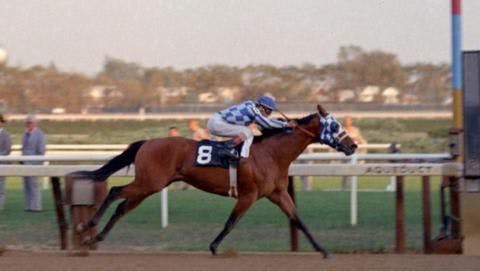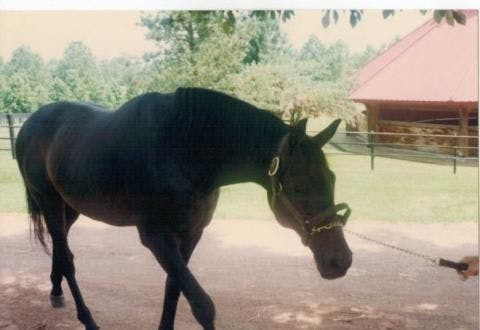Riva Ridge-Key to the Mint rivalry one of racing's most underrated

Coglianese Photos

(Riva Ridge race photos: Coglianese Photography)
In the waning days of June 1972, Riva Ridge was firmly on top of the Thoroughbred world in the U.S. Weeks earlier, the reigning juvenile champion and Kentucky Derby winner had rebounded from a shocking fourth-place finish in the Preakness, contested over a muddy strip at Pimlico, to win the Belmont S. by seven lengths.
With the older male division in relative shambles and no clear-cut superstars elsewhere, there was apparently little standing in between Riva Ridge and a Horse of the Year title.
Less than 10 days after the calendar turned to July, the complexion of the entire racing season surprisingly began to change.
On the first of the month, Riva Ridge reappeared in the Hollywood Derby over 1 1/4 miles. Back on the track a mere three weeks after the Belmont and carrying 129 pounds, Riva Ridge was pressured into setting a fast pace and barely scraped across the finish line ahead of Bicker, who at that point had never won a stakes and was in receipt of 15 pounds. The lemon was starting to run dry.
Three days later, a two-year-old stablemate of Riva Ridge's named Secretariat went postward in his debut at Aqueduct. Impeded early in the 5 1/2-furlong race, the chestnut son of Bold Ruler was 10th of 12 at the quarter pole but made an eye-catching rally in deep stretch to finish fourth. It would be the only time the entire season Secretariat would not cross the finish line first.

(Key to the Mint race photos: Coglianese Photography)
On July 8, in the Brooklyn H. at Aqueduct, Riva Ridge's nominal three-year-old rival Key to the Mint scored a wire-to-wire victory in the 1 3/16-mile event over Autobiography, equaling the track record. After sidestepping the Kentucky Derby after an injury delayed his preparation, Key to the Mint had run third in the Preakness but was beaten senseless by Riva Ridge in the Belmont, a loss trainer Elliott Burch blamed on a fast work prior to the grueling 1 1/2-mile classic.
The story of Secretariat from July 1972 on is well known. Less remembered is the long-standing racetrack feud between Riva Ridge and Key to the Mint, a rivalry that encompassed 10 races over three seasons. Possible reasons for the oversight is the fact when Key to the Mint did get the upper hand, he often did so on wet tracks, a condition Riva Ridge was known to detest (or not). Additionally, Key to the Mint finished first in only one of their nine meetings, while Riva Ridge won five.
At two, Riva Ridge was the undisputed leader of the crop, not only beating Key to the Mint in a maiden, the Futurity, and the Garden State, but also the juvenile filly champion Numbered Account in the latter event.
Riva Ridge continued to rack up wins at three, preceding his classic scores with triumphs in the Hibiscus at Hialeah and the Blue Grass at Keeneland. Key to the Mint, who went to the sidelines with a leg bruise after two poor efforts at Hialeah, returned in time to win the Derby Trial at Churchill and later squeezed in a victory in the Withers between his Preakness and Belmont losses.
With the patient owner-trainer combo of Paul Mellon and Elliott Burch in his corner, Key to the Mint turned the tide in the second half of 1972. Following the Brooklyn, Key to the Mint scored another win over older horses in the Whitney, won the Travers, and awaited yet another meeting with Riva Ridge in the Woodward over 1 1/2 miles.
Following his narrow escape in the Hollywood Derby, Riva Ridge ran a puzzling fourth in the Monmouth Invitational H., an effort later blamed on the effects of a tranquilizer he was mysteriously given. Ten days before the Woodward, Riva Ridge tuned up in the Stymie H., but lost by five lengths in world-record time for 1 1/8 miles to Canonero II, the previous year's three-year-old champion who was hardly championship caliber at four.
Despite the recent setbacks and the presence of a sloppy surface, bettors made Riva Ridge the 7-5 favorite for the Woodward at Belmont, which was extended from 1 1/4 miles that year. The entry of Key to the Mint and his filly stablemate Summer Guest were 17-10.
"This surface won't bother Riva at all," trainer Lucien Laurin told Sports Illustrated early on Woodward day. "He's a long-striding horse who needs sure footing, and that's what slop at Belmont provides. The going here won't be at all like the slippery, greasy muck in the Preakness at Pimlico. Belmont's track has a superior bottom and a higher sand content. None of us should have an excuse."
Riva Ridge and Key to the Mint dueled for nearly 10 furlongs before Key to the Mint asserted himself approaching the stretch. Leading by three lengths in mid-stretch, the Rokeby Stable colorbearer eventually crossed the wire 1 1/4 lengths in front of Summer Guest, who was later demoted from second to third after interfering with Autobiography. Riva Ridge finished fourth, beaten 6 1/4 lengths.
"They said you could never look [Riva Ridge] in the eye and pass him. Well, we looked him in the eye and you know who passed who," jockey Braulio Baeza, aboard Key to the Mint, told the Associated Press.

(Key to the Mint at Gainesway Farm photo: Vance Hanson)
A fast track at Aqueduct awaited the pair four weeks later in the Jockey Club Gold Cup. What was supposed to be Key to the Mint's Horse of the Year coronation turned out to be a surprising, division-clinching romp for the four-year-old Autobiography who, after three previous losses to Key to the Mint, finally turned the tables in emphatic style over two miles. The winning margin was 15 lengths over Key to the Mint, who finished ahead of Riva Ridge by three lengths.
In a case of winning the battle but losing the war, Key to the Mint won the three-year-old title over Riva Ridge, who ran once more in the Washington, D.C. International on turf and lost by 38 lengths, but was outpolled in the Horse of the Year balloting by Secretariat.
With Secretariat's exploits in the Triple Crown and beyond all the talk of the 1973 season, the Riva Ridge-Key to the Mint rivalry failed to regain steam. Slop at Belmont again gave Key to the Mint an advantage in the Metropolitan H., though he could only finish second to Riva Ridge's seventh. Over a fast track at Aqueduct on the Fourth of July, Riva Ridge halted his rival's Brooklyn title defense in a still-standing track record of 1:52.40 for 1 3/16 miles, beating True Knight by a head with Key to the Mint more than five lengths behind in fourth.
The final meeting between the two occurred in the inaugural Marlboro Cup. Ostensibly a made-for-television showcase for Secretariat, the race also served as the championship-deciding showdown among the older set with Cougar II, Kennedy Road, and Onion joining the previous year's three-year-old combatants.
As expected, no one could keep pace with Secretariat, but Riva Ridge finished an admirable second, 3 1/2 lengths behind his stablemate. Meanwhile, Key to the Mint, who had not raced since winning the Suburban H. nearly two months earlier, failed to show his customary tactical speed and finished last of seven, 17 lengths behind "Big Red."
Riva Ridge walked away with another division title at the end of the year, and with two classics to his name also earned a spot in the Hall of Fame. Key to the Mint, with only the three-year-old title to brag about, arguably didn't do enough to earn a similar accolade. At the very least, the beautiful dark bay will be remembered as an integral part of one racing's most underrated rivalries.
(Riva Ridge, Key to the Mint race photos: Coglianese Photography)
ADVERTISEMENT



